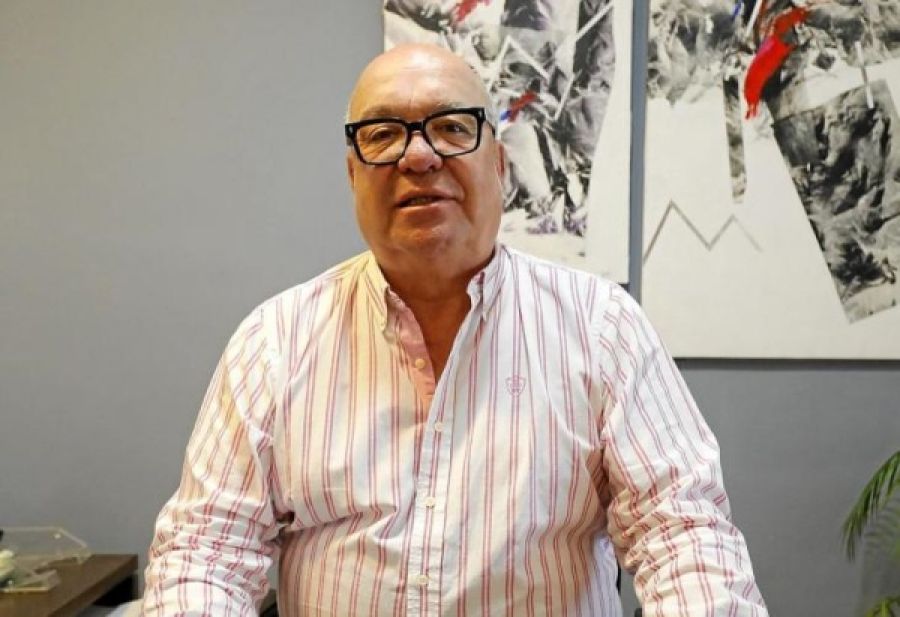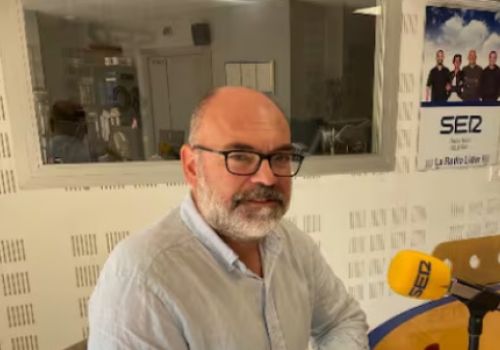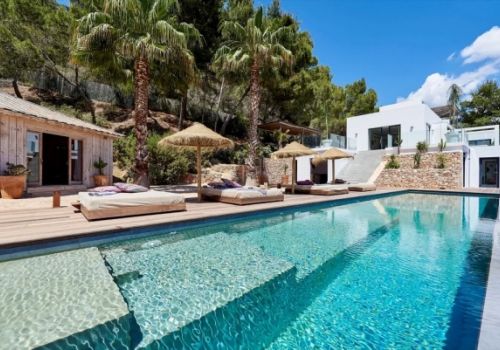Roberto San Esteban: «We have a fabulous product, for the future»

Interview with the President of AVAT, Roberto San Esteban. PHOTO: Periódico de Ibiza y Formentera.
SOURCE: PERIÓDICO DE IBIZA Y FORMENTERA (El Económico), 23 APRIL 2023
Google Translate
María José Real
Roberto San Esteban (London, 1958) resumed the presidency of the Association of Holiday Tourist Homes of Ibiza (Avat) a year ago. In this second year at the head of this accommodation employer, his work objectives are to continue attracting members (currently it has 240 associates, representing nearly 420 vacation homes) in order to continue "joining forces and creating a lobby, between quotes, within of what accommodation is like on the island». In this sense, another of its main objectives is to "clean up the image of the holiday tourist housing sector since, within the tourist panorama, in an interested or disinterested way on the part of the hoteliers, all the bad things are blamed on us when this is not the case . We fight against illegalities, we do not promote overcrowding and we are not multi-family homes. At this point, the president of Avat recalls that renting apartments to tourists is one thing, which is completely prohibited on the island of Eivissa, and another is renting holiday houses or tourist villas, which pay their corresponding fee to register. as such and thus meet a series of requirements and pay taxes. San Esteban acknowledges that intrusion "has always existed" in its sector, but also in the rest of the island's economic activities. «There are houses without a license and tourist stays that are rented; In recent years, large villas and chalets have mainly been built with the idea of using them for rent and then no licenses have been issued and they have been rented the same. It is difficult to control the whole problem of intrusions because there would have to be a lot of staff in the administration and even if they put a lot of staff, the deadlines are what they are and the sanctions are not resolved promptly; they arrive after two, three or four years”.
THE NUMBERS.
Currently, the holiday home sector in Eivissa has a total of 19,000 beds, a figure that cannot be increased due to the four-year moratorium (there are three left to complete the moratorium) of the new Balearic tourism law, which prevents the granting of new licenses or authorizations to operate holiday homes. Added to this is the latest revision of the Eivissa Island Territorial Plan (PTI) which prohibits the granting of new tourist authorizations on rural land, thus de facto preventing new homes, villas or chalets in the countryside. It should be remembered that these two aspects had the support of the Pitiusa hotel management. "With the moratorium and the modification of the PTI, the granting of tourist places on rustic land has become and will continue to be practically impossible," says San Esteban, who points out that holiday tourist homes do not generate overcrowding.
“It must be taken into account that hotels have been acquiring tourist beds since the beginning of tourism on the island. Tourist homes only since 2012. There are 19,000 tourist beds in holiday homes over the 85,000 that hotels have”, points out the president of Avat, who specifies that currently the stock of available tourist beds in Eivissa is around 9,000. «Holiday tourist homes are a fabulous product, for the future in Eivissa, where a good part of the tourists who visit us enjoy the island in a different way. But we are the 'ugly duckling' of the tourism sector because the administration and businessmen end up blaming us for the lack of available accommodation, as well as for trying to destroy the Ibizan landscape and countryside and, obviously, we are not responsible for everything we are accused of. We will continue fighting to reverse this image," says San Esteban, who points out that they have frequent meetings with the administration, but "all are good words and nothing more."
Regarding the lack of accommodation at affordable prices that Eivissa is suffering, San Esteban points out that hoteliers began a "change in trend" and bet heavily on reforms to upgrade, "which has instantly caused a rise in generalized prices of the entire tourism sector and also of vacation rental homes. A luxury island is implicit with luxury accommodation and this will continue to drag on for several years" since, as he considers, the island is focusing "too much" on the luxury sector, which in turn leads private individuals to with apartments rented at exorbitant prices by season or throughout the year.
BEFORE AND AFTER.
During the three years of the pandemic, the holiday tourist housing sector has worked very well in Eivissa, as recognized by the president of Avat. "We have been one of the sectors that has suffered the least from the pandemic in the sense that isolation and bubble groups have benefited us." In the covid era, a problem arose that was directly linked to the sector that San Esteban represents and were the illegal parties in villas and country houses, although it is true that the president of Avat points out that this problem did not occur in owners or marketers that they had a tourist stay license and that, therefore, they were legally present. After much request by the Consell d'Eivissa, the Government approved in May of last year a decree law against illegal parties that contemplated sanctions of up to 300,000 euros not only for the organizers of such legal events but also for the owners of the houses where they take place. was developing this illegality. «This problem has been diluted because last year all the clubs opened without restrictions and people prefer to be in clubs because there is much more atmosphere than in a house. Perhaps there has been a follow-up party after the night at the disco, but it has been something residual. It is not a problem that is currently affecting us and when it occurred, it did not occur among the associates, ”says San Esteban.
One of the points on which the Avat employers worked to avoid problems with excessive noise is the development of an application through a company to detect excess noise and warn tourists staying in these houses. “This app exists and is available to owners who may be interested. A device is placed inside and outside the house, which detects when there is excessive noise, a notice is issued by the company and the client who is staying is called to warn him and if he recurs, then Call the police," he says.
After the covid, the holiday tourist housing sector has not suffered. In this sense, last year was a good year. «In general, both sellers and owners ended up happy. It was a profitable year, but not entirely because there were many reservations for 2020 and 2021 that were placed last year at covid-era prices, which were lower. It was not tremendously profitable and, in addition, we had to assume the costs derived from the war in Ukraine, ”says San Esteban. This year, unlike the previous one, they have been able to act with a margin and have raised prices due to the constant increase in costs. However, the president of Avat acknowledges, in a personal capacity, that in some cases these price increases "have been done a bit by show of hands, above the increase in costs." Despite the price increase, the season has already officially started in the sector with the early arrival this year of Holy Week, a period in which close to 40% of the legal offer has already begun to work with occupations between 70% and 80%. «April is working very well, May is expected to be good. At the beginning of May the rest of the vacation homes will open. June is expected to be regular and the rest remains to be seen how it evolves. And it is that the situation derived from the war in Ukraine, with the consequent increase in costs and prices, is making tourists look more at what they spend their money on.
«Beginning and mid-January was very good in terms of sales and now we are noticing a drop in these weeks. We have had more cancellations than we usually have at this time and we understand that it is due to the economic crisis derived from the war in Ukraine, which has caused the prices of everything to rise, planes, food, restaurants, clothing, etc. shoes, lodging…”. At the moment, the sector is not worried, although it is "somewhat restless" and they are waiting to see how the weeks evolve and detect whether or not there will be changes in trend. "If fewer or more days will be booked at the last minute, for example," says San Esteban, who points out that the clear trend is that most people "look more at what they spend their money on, even on vacation" . On whether they will make offers or discounts if they detect a prolonged drop in reserves over time, the president of the Avat employers' association points out that this is an “individual matter and what each owner decides; everyone knows what they have at home. In general, the president of Avat believes that there will be a good tourist season in Eivissa since the island «has a very powerful brand, unique as the Ibiza brand is and will continue to be so; people want to travel and the island continues to be a preferred place to spend vacations”. And he adds: «You have to see what the trend will be: if stays will be shortened or not, for example. It is still early for it, “he concludes.








